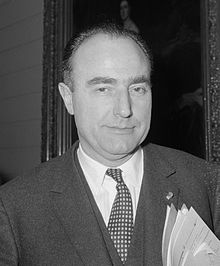Paul Vanden Boeynants
Paul Vanden Boeynants | |
|---|---|
 Paul Vanden Boeynants in 1966 | |
| Prime Minister of Belgium | |
| In office 20 October 1978 – 3 March 1979 | |
| Monarch | Baudouin |
| Preceded by | Leo Tindemans |
| Succeeded by | Wilfried Martens |
| In office 19 March 1966 – 17 June 1968 | |
| Monarch | Baudouin |
| Preceded by | Pierre Harmel |
| Succeeded by | Gaston Eyskens |
| Minister of Defense | |
| In office 1972–1979 | |
| Prime Minister | Gaston Eyskens Edmond Leburton Leo Tindemans |
| Preceded by | |
| Succeeded by | José Desmarets |
| Personal details | |
| Born | 22 May 1919 Forest, Belgium |
| Died | 9 January 2001 (aged 81) Aalst, Belgium |
| Political party | Christian Social Party Humanist Democratic Centre |
Paul Emile François Henri Vanden Boeynants (pronounced [ˈpɔl vandən bujˈnants]; 22 May 1919 – 9 January 2001) was a Belgian politician.[1] He served as the prime minister of Belgium for two brief periods (1966–68 and 1978–79).[1]
Career[]
Vanden Boeynants (called "VDB" by journalists) was born in Forest / Vorst, a municipality in the Brussels-Capital Region. Active as a businessman in the meat industry, he was a Representative for the PSC-CVP between 1949 and 1979. From 1961 to 1966 he led the Christian democrat PSC-CVP (which was in those days a single party). He led the CEPIC, its conservative fraction.
Vanden Boeynants served as minister for the middle class (1958-1961). In 1966, he became Prime Minister of Belgium; he stayed in this post for two years. From 1972-1979 he served as minister of defense. In 1978–1979 he led another Belgian government. Vanden Boeynants then served as chairman of the PSC (1979-1981). He left politics in 1995, and died of pneumonia after undergoing cardiovascular surgery in 2001.
One of his famous expressions, in a unique mixture of Dutch and French, was: Trop is te veel en te veel is trop. ("too many is too much and too much is too many").[2]
Fraud[]
Convicted in 1986 for fraud and tax evasion, Vanden Boeynants was given a suspended jail sentence of three years.[2] This prevented him from pursuing mayoral aspirations in Brussels. He underwent a political rehabilitation during the early 1990s.
Kidnapping[]
In an incident that is still the subject of dispute, Vanden Boeynants was kidnapped on 14 January 1989 by members of the Haemers criminal gang.[3] Three days later, the criminals published a note in the leading Brussels newspaper Le Soir, demanding 30 million Belgian francs in ransom. Vanden Boeynants was released unharmed a month later, on 13 February, when an undisclosed ransom was paid to the perpetrators. The gang members were caught and imprisoned. Patrick Haemers, the head of the gang, later committed suicide in prison,[4] and two members of his gang managed to escape from the St Gillis Prison in 1993.
In popular culture[]
The kidnapping was referenced in a 1989 novelty song by the New Beat band Brussels Sound Revolution called "Qui...?", which featured samples from the press conference Vanden Boeynants gave after his kidnapping.[5][6][7] It was a hit on both sides of the Belgian language border. In Flanders, Belgium, it reached the 28th place in the Radio 2 hitparade at the time for one week.[8]
Honours[]
 Belgium: Minister of State, by Royal Decree.[9]
Belgium: Minister of State, by Royal Decree.[9] Belgium: Grand Cordon in the Order of Leopold.[9]
Belgium: Grand Cordon in the Order of Leopold.[9] Belgium: Knight Grand Cross in the Order of Leopold II.[9]
Belgium: Knight Grand Cross in the Order of Leopold II.[9]- Knight Grand Cross in the Order of Saints Michael and George.[9]
- Grand Officer in the Legion of Honour.[9]
Literature[]
- N. Hirson, Paul Vanden Boeynants, Brussels, 1969.
- Paul Debogne, Les Amis de Paul Vanden Boeynants et leurs Affaires, Ed. Vie Ouvrière, Brussel, 1970.
- R. Stuyck, Paul Vanden Boeynants, boeman of supermen?, Brussels, 1973.
- Els Cleemput & Alain Guillaume, La rançon d'une vie. Paul Vanden Boeynants 30 jours aux mains de Patrick Haemers, Brussels, 1990.
- D. Ilegems & J. Willems, De avonturen van VDB, Brussels, 1991.
- P. Havaux & P. Marlet, Sur la piste du crocodile, Brussels, 1994.
- Armand De Decker, In memoriam Paul Vanden Boeynants, Belgian Senate, 18 January 2001.
References[]
| Wikimedia Commons has media related to Paul Vanden Boeynants. |
- ^ Jump up to: a b January 2001. Rulers. Retrieved 30 August 2014.
- ^ Jump up to: a b "In memoriam", De Standaard, 9 January 2001
- ^ Dick Leonard (16 January 2001) Paul Vanden Boeynants. The Independent, Retrieved 3 April 2011
- ^ Death sentence for gangsters. The Independent, 30 January 1994, Retrieved 3 April 2011
- ^ "'Qui..?' van Brussels Sound Revolution". Het Laatste Nieuws.
- ^ Grommen, Door: Stefan. "25 jaar geleden werd 'VDB' ontvoerd: Gemarchandeerd zoals op de beestenmarkt".
- ^ "Brussels Sound Revolution's 'Qui...?' - Discover the Sample Source". www.whosampled.com.
- ^ "Archived copy". Archived from the original on 12 March 2017. Retrieved 9 March 2017.CS1 maint: archived copy as title (link)
- ^ Jump up to: a b c d e "VAN DEN BOEYNANTS". www.ars-moriendi.be.
External links[]
- 1919 births
- 2001 deaths
- 20th-century Belgian criminals
- 20th-century Belgian politicians
- 20th-century Belgian businesspeople
- Belgian fraudsters
- Belgian Ministers of State
- Belgian Roman Catholics
- Christian Social Party (Belgium, defunct) politicians
- Recipients of the Grand Cross of the Order of Leopold II
- Kidnapped Belgian people
- Kidnapped politicians
- Missing person cases in Belgium
- People from Forest, Belgium
- Prime Ministers of Belgium